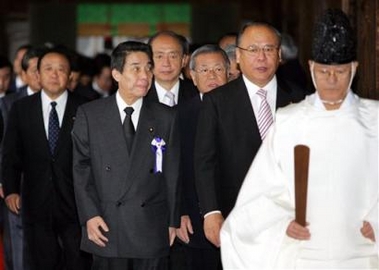|
Some 200 Japan lawmakers visit Yasukuni war shrine
(Reuters)
Updated: 2005-10-18 09:40
Some 200 Japanese lawmakers paid their respects at a Tokyo shrine for war
dead on Tuesday, one day after Prime Minister Junichiro Koizumi outraged China
and South Korea by visiting the shrine, a spokesman for the shrine said.
The parliamentarians are members of a group that usually visits the Yasukuni
shrine -- seen by critics at home and abroad as a symbol of Japan's past
militarism -- during spring and autumn festivals such as the one taking place
this week.
Japan's relations with its neighbours could go into a deep freeze following
Koizumi's latest visit, his fifth since taking office in 2001, to Yasukuni,
where war criminals convicted by an Allied tribunal are honoured along with 2.5
million war dead.
![Japan's Ruling Liberal Democratic Party lawmakers, lead by party's Secretary-General Tsutomu Takebe, third from right, visit Yasukuni Shrine Tuesday morning, Oct. 18, 2005 in Tokyo. [AP]](xin_511002180943026224145.jpg)
Japan's Ruling Liberal Democratic Party
lawmakers, lead by party's Secretary-General Tsutomu Takebe, third from
right, visit Yasukuni Shrine Tuesday morning, Oct. 18, 2005 in Tokyo.
[AP] | A meeting tentatively planned for later
this week between Foreign Minister Nobutaka Machimura and Chinese Foreign
Minister Li Zhaoxing to discuss a possible Sino-Japanese leaders' summit is now
in doubt, while a South Korean presidential aide said on Monday that President
Roh Moo-hyun was unlikely to meet Koizumi for their semi-annual summit meeting
this year.
Machimura told reporters, however, that the diplomatic schedule should not be
affected.
"We will seek (the two countries') understanding through various channels,"
Machimura said. "I think that various scheduled meetings should take place as
planned."

Japan's Ruling Liberal Democratic Party lawmakers, lead by
party's Secretary-General Tsutomu Takebe, second from right, visit
Yasukuni Shrine Tuesday morning, Oct. 18, 2005 in
Tokyo.[AP] | Japanese business executives are
worried the diplomatic strains will hurt economic relations especially between
China and Japan, which have annual trade worth about $212 billion.
"Japan's relations with China and South Korea are the most important
bilateral ties after those with the United States, and a deterioration is a
minus for Japan's national interests," said an editorial in the Nihon Keizai
Shimbun financial daily.
"Even if there is conflict politically between the countries, we must avoid
this having an impact on economic ties and private sector exchanges," the
newspaper said.
|